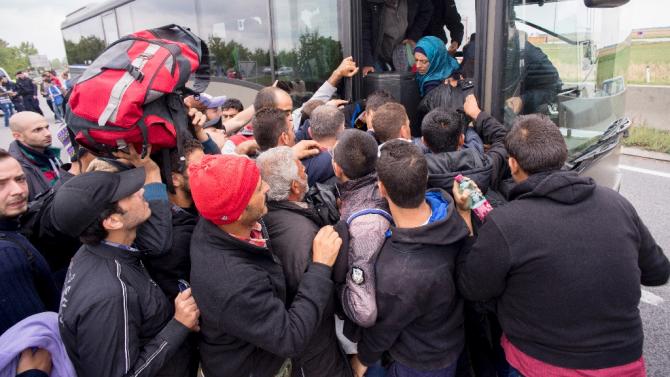Date: Fri, 11 Sep 2015 18:55:07 +0200
September 11, 2015
Paris (AFP) - Although Europe is experiencing its biggest movement of people since World War II, it has coped with several mass migrations in the past 60 years.
With figures in the immediate post-war period hard to come by, one of the most noticeable periods was in the early 1990s after the collapse of the communist regimes.
- Algerian settlers: After the seven-year French-Algerian war ended in March 1962, around 200,000 French nationals who had settled there quickly returned to Europe. French authorities had thought most settlers would apply for Algerian citizenship, but the numbers eventually increased to around a million.
As other colonies in Africa and Asia shook off French rule, a total of 1.5 million people returned, including 260,000 from Morocco, 180,000 from Tunisia 15,500 from sub-Saharan Africa and Madagascar, and 44,000 from southeast Asia.
- "Guest workers": West Germany's post-war economic miracle compelled it to recruit workers from Greece, Italy, Portugal and Turkey. By 1973, when the first "oil shock" hit, these so-called guest workers numbered 2.6 million.
- Eastern Europeans: After the Berlin Wall crumbled in late 1989, ethnic Germans known as "Aussiedler" (emigrant or resettler) left countries where they had been living, often in the former Soviet Union, to return to a reunified Germany. Since then, some three million such citizens have been "repatriated."
Meanwhile, the violent break-up of the former Yugoslavia sent hundreds of thousands of people fleeing to western Europe, and to Germany in particular.
From 1990 to 1992, fighting in the former Yugoslavia forced almost a half million people to seek asylum, at least three-quarters of whom ended up in Germany.
- Albanians: When the hardline communist regime in Albania collapsed in the early 1990s, around 400,000 Albanians left for Greece and roughly the same number went to Italy over the course of several years.
- Portuguese: Portugal has been both a source of emigrants and a former colonial power. When the former colonies of Mozambique and Angola gained independence in 1975, it received an influx of around 500,000 people, some of whom came from Cape Verde and Sao Tome.
- Spain: When Ecuador adopted the US dollar as legal tender in early 2000, more than 300,000 people resettled in Spain. Many returned however when Spain suffered a subsequent economic crisis.
- Vietnamese/Cambodians: The collapse of governments in South Vietnam and Cambodia in April 1975 and subsequent political developments in southeast Asia sparked waves of so-called "boat people", the precise numbers of which are hard to establish since many did not obtain official refugee status. According to the UN Refugee Agency (UNHCR), between 1975 and 1995, Europe accepted more than 174,000 documented Indochinese refugees, with France, Britain and Germany taking the most.
